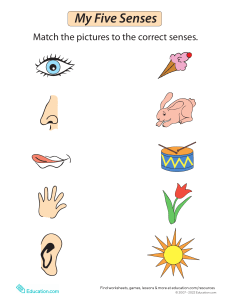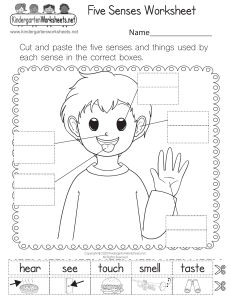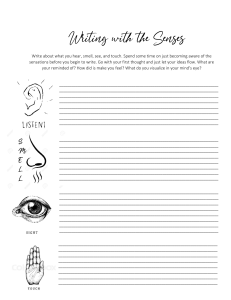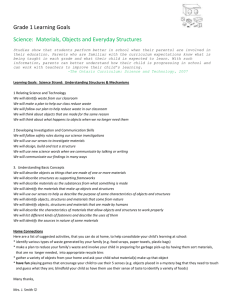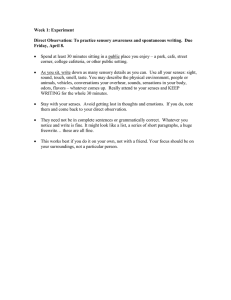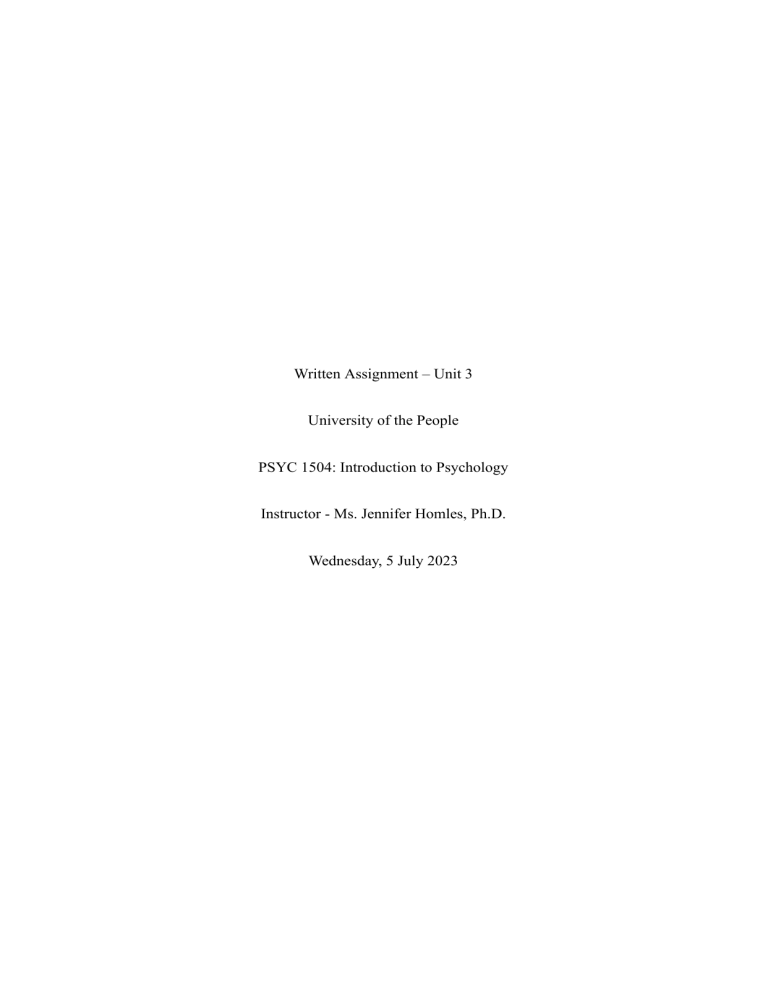
Written Assignment – Unit 3 University of the People PSYC 1504: Introduction to Psychology Instructor - Ms. Jennifer Homles, Ph.D. Wednesday, 5 July 2023 1 Expanding our Understanding of Senses, Definitions, and Skill Development Introduction In this written assignment, we will delve into the realm of senses, definitions, and skill development. The traditional classification of senses includes sight, hearing, touch, taste, and smell. However, we will explore the possibility of additional senses that originate from within us. Furthermore, we will discuss the role of definitions in shaping our understanding of concepts and examine how the definition of sensation may need expansion. Lastly, we will explore the role of operant conditioning in the development of reading skills and analyze its potential universality in skill development. The Existence of Internal Senses Our traditional understanding of senses mainly focuses on the information we receive from the environment. However, it is plausible that we possess senses that originate from within ourselves. For instance, hunger is a sensation that arises internally and prompts us to seek sustenance. Similarly, the need for air is sensed within our bodies, triggering a response to breathe. Additionally, the sensation of the need for belonging arises from our emotional and social connections. These internal senses play a crucial role in our daily lives, guiding our behavior and influencing our well-being. Potential Reasons for Overlooking Additional Senses While the traditional five senses have received significant attention from the scientific community, the consideration of additional senses might have been limited. This limitation could be attributed to the dominant scientific focus on external stimuli and measurable phenomena. Scientific methods often rely on observable and quantifiable data, making it 2 challenging to investigate and measure internal senses. Moreover, biases and assumptions within the scientific community might have influenced the exclusion of additional senses, as they were not part of the initial framework. The Role of Definitions in Conceptual Boundaries Definitions play a crucial role in establishing the parameters and understanding of a concept. They help us communicate and differentiate between various phenomena. However, rigid definitions can hinder the expansion of a concept by confining it within predetermined boundaries. To foster conceptual growth, it is essential to embrace flexibility and adaptability in defining concepts. This openness allows for the exploration of new dimensions and the inclusion of previously overlooked aspects. Expanding the Definition of Sensation Currently, sensation is primarily defined as the process of receiving information from the external environment through our traditional five senses. However, this definition overlooks the internal sensations we discussed earlier. Expanding the definition of sensation to encompass these internal experiences would provide a more comprehensive understanding of human perception. Including internal sensations acknowledges their significance in guiding our actions and enriches our comprehension of human experiences. The Role of Operant Conditioning in Reading Skills Development Operant conditioning is a learning process that influences the development of various skills, including reading. By associating certain behaviors with positive reinforcement or rewards, individuals are motivated to repeat those behaviors. In the context of reading, operant conditioning can strengthen reading skills by rewarding desired behaviors, such as reading 3 accurately or completing comprehension tasks. Over time, through repetition and practice, reading skills become more automatic as they are reinforced and ingrained. Generalization of Skill Development The development of reading skills shares similarities with other skills, suggesting a common underlying mechanism in skill development. Repetition, practice, and reinforcement play pivotal roles in acquiring and improving a wide range of skills, not just reading. The generalization of skill development pathways underscores the importance of recognizing shared principles and approaches in skill acquisition. Understanding these underlying mechanisms can enhance our ability to facilitate skill development in various domains. Conclusion In conclusion, our exploration of senses, definitions, and skill development has shed light on intriguing aspects of human experience and learning. Acknowledging the existence of internal senses broadens our understanding of perception and behavior. Moreover, recognizing the impact of definitions on conceptual boundaries highlights the need for flexibility and adaptability in defining concepts. Expanding the definition of sensation to include internal sensations enriches our comprehension of human experiences. Furthermore, operant conditioning plays a crucial role in the development of reading skills, as it reinforces desired behaviors and promotes automatization. The principles of operant conditioning can be applied to various skill development processes, emphasizing the universality of skill acquisition. To deepen our understanding of these topics, further research could explore the specific mechanisms underlying internal senses, investigate the biases that may have influenced the 4 exclusion of additional senses, and delve into the application of operant conditioning in various skill domains. By expanding our knowledge of senses, definitions, and skill development, we gain valuable insights into the complexities of human perception and learning. Embracing a comprehensive understanding of these concepts allows us to better support individual growth and optimize learning environments. 5 References Spielman, R., Dumper, K., Jenkins, W., Lacombe, A., Lovett, M. & Perlmutter, M. (2017). Psychology. OpenStax College, Rice University. Raygor, A. L., Wark, D. M., & Warren, A. D. (1966). Operant Conditioning of Reading Rate: The Effect of a Secondary Reinforcer. Journal of Reading, 9(3), 147–156. http://www.jstor.org/stable/40009405 Cherney, E. E. (1976). Operant tool conditioning as a tool for reading remediation. Michigan Reading Journal, 10(2), Article 10.
